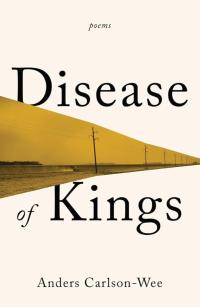An Interview with Anders Carlson-Wee
Taylor Brorby: Thanks so much for making the time to join us at North American Review, Anders. Your latest collection, Disease of Kings, is just out from W.W. Norton. Can you tell us a bit about its origins?
Anders Carlson-Wee: Disease of Kings grew out of my lifestyle in my twenties, which centered on living as frugally as possible. When I finished high school I knew I wanted to go into the arts, and I knew that meant I’d never have any money (haha). I decided I needed to learn how to be self-reliant, so I attended several wilderness survival schools. At those schools, I learned how to build primitive shelters, track animals, start fires from sticks, and so on. But from the anarchist kids who hung out at those schools, I also learned about urban survival: how to dumpster dive for food, clothing, shoes, bikes, camping gear—you name it. With these news skills in hand, I set out to eliminate money from my life. I stopped buying food and clothing, and I stopped frequenting establishments that cost money—meaning all of them: cafes, bars, restaurants, malls, concert venues, etc. All I paid for was my humble rent ($195/month) and emergencies. This whole thing might sound insane, but to my mind, buying myself ample free time was the best way to become a writer. And it worked, more or less: I spent my twenties reading and writing and working part-part-time (about four hours/week) as a personal trainer at the YMCA, a job I got through a clerical error. Perhaps fittingly, Disease of Kings is about those years—particularly the mindset of those years—and writing it was made possible by that mindset.
TB: To my mind, poetry is oftentimes the testing grounds for some of our most illustrative and radical thinking in literature. In your collection you explore characters on the fringes of society—people who dumpster-dive for their food, or, as you say in your poem “Ambition,” people who live on “scams and hustles and handouts.” How are characters like these relevant to our current moment in America?
AC-W: I’d sort of flip that question around. I don’t think people/characters are relevant to circumstances, but rather, circumstances are relevant to them. The characters in Disease of Kings are very much of their time and their country, and their lifestyle takes full advantage of the world they find themselves in. They live in a culture that produces a scale of waste that is nearly unfathomable. In response, they take that waste and alchemize it into a superabundance that allows them to live in a kind of makeshift splendor. But I’m not writing about the waste or the culture—I’m writing about my characters. Who they are. How they live. And at what cost.
TB: Your collection focuses on non-coastal cities—Fargo, Des Moines, Minneapolis. How have these places inspired you and your views on poetry and its possibilities—or on the necessity for poetry to exist beyond the borders of Brooklyn and Los Angeles?
 AC-W: Growing up in Moorhead, Minnesota, I was painfully aware that I was from nowhere—a place that didn’t matter, a place of the third- and fourth-rate, a place of racism, sexism, homophobia, and backward thinking. I was a skater, and as a skater, I wanted nothing more than to escape to California—or at the very least, Minneapolis. Eventually I did escape to Minneapolis. And although the skating was unimaginably better, I found I didn’t fit in there either. I think that may have been the beginning of a profound loneliness that has haunted me ever since. It was like arriving at Heaven’s gates only to discover that, while it was lovely, and shone with everything you’d heard it would, and more, somehow you weren’t of it. I feel that way everywhere. I think that sense of inescapable lonesomeness led me to literature. Reading books, I felt I could sit inside the depths of my solitude and simultaneously touch another heart. That reaching, that yearning, while internal, can be represented by place and geography. My first book, The Low Passions, is essentially a travel marathon, a book of constant movement and adventure and newness. In contrast, Disease of Kings is about a character who is stuck, and knows it, and aims to maintain it. He wants nothing new, and instead wants to keep what he has. I set the book in Minnesota because that place represents a sort of stuckness in me, the opposite of newness and movement.
AC-W: Growing up in Moorhead, Minnesota, I was painfully aware that I was from nowhere—a place that didn’t matter, a place of the third- and fourth-rate, a place of racism, sexism, homophobia, and backward thinking. I was a skater, and as a skater, I wanted nothing more than to escape to California—or at the very least, Minneapolis. Eventually I did escape to Minneapolis. And although the skating was unimaginably better, I found I didn’t fit in there either. I think that may have been the beginning of a profound loneliness that has haunted me ever since. It was like arriving at Heaven’s gates only to discover that, while it was lovely, and shone with everything you’d heard it would, and more, somehow you weren’t of it. I feel that way everywhere. I think that sense of inescapable lonesomeness led me to literature. Reading books, I felt I could sit inside the depths of my solitude and simultaneously touch another heart. That reaching, that yearning, while internal, can be represented by place and geography. My first book, The Low Passions, is essentially a travel marathon, a book of constant movement and adventure and newness. In contrast, Disease of Kings is about a character who is stuck, and knows it, and aims to maintain it. He wants nothing new, and instead wants to keep what he has. I set the book in Minnesota because that place represents a sort of stuckness in me, the opposite of newness and movement.
TB: This collection is so cohesively solid, as if you knew there was going to be an entire book between the two scammers—did you? Were you driving at that idea, these characters, to create this collection? Or did you find, over time, “Hey, I think there might be a project here” while writing many and varied poems?
AC-W: Arriving at a collection with a cohesive narrative was weirdly organic. I drafted a poem about North, then another, and it was feeling good, and was sort of overtaking my mind, so I kept going. Simultaneously, I found myself drafting poems of extreme loneliness and desolation. I didn’t intend the contrast between friendship and isolation, which now, in hindsight, seems like a natural counterpoint. I was just writing. Following obsessions. My mind fixated on these characters and narratives, and once I was possessed by them, I couldn’t seem to stop. It was all basic instinct. That said, it’s not like it poured out of me in a rush, intact. The effort was painstaking. I drafted poems for Disease of Kings over the course of six years, and I threw away almost everything. For example, I wrote more than twenty monologues in Oscar’s voice before arriving at the one poem that would become “Oscar.” I know all about him: his childhood, his family, his maladies, his lost loves, and so on—way more than I let my readers have access to. Similarly, there are three prose poems in the book, but I drafted more than fifteen for the series, then chose the best three. I call this the accordion approach to writing and revision: draft way more than you need, then cut everything except the best, then do it again, and again, and again. Deciding what’s worth keeping is terribly difficult: you have to kill things that are precious to you. I let poems sit on the shelf for two or three months and then revisit them. If they don’t hold up, they’re axed. If they do hold up, I show them to a trusted reader. If they hold up for the trusted reader, I show them to a second. If they keep holding up, they might just make it. Finally, I eliminate poems that serve the same purpose, or cover too much of the same ground–again, opting for the better of two, or the best of five. In the end, you have the best of the best of the best. The thirty-nine poems in Disease of Kings represent a fraction of what I drafted for the project.
TB: Jack Gilbert is a cherished poet of yours. How do you feel his influence in your poetry?
AC-W: I only wish I could be influenced by Jack Gilbert more, particularly in terms of tone. I find his tone to be a kind of miracle. (If you don’t know his work, stop reading this interview and go find it. You’re in for a real gift.) But it’s not that I want to have his tone, I want to understand tone well enough to nail my own. As a reader, I just want to keep reading his poems.
TB: Can you tell us a bit of your process from beyond the page? I know you’re focused currently on rock climbing, and historically you’ve been an accomplished tree climber, having studied the movement of apes, as well as a personal trainer. How’s being physical influenced your poetic process?
AC-W: My whole writing process is rooted in the physical. I went to Fairhaven College, where everyone designs their own degree; mine was called “Writing through the Body” and combined creative writing with somatic psychology, with a focus on the human body–and the human breath–as the instrument for poetry. Needless to say, there was an implicit focus on the oral tradition, which suited me: I have dyslexia and struggled to learn how to read and write, and therefore developed a deep suspicion of the written word and a deep reliance on the spoken word. In fact, as a child, I did what’s called “mirror writing,” which means you write backwards, and if you hold your writing up to a mirror, it looks correct. During that time, I was ashamed that I couldn’t read, and when my parents would read aloud to me, after they finished a page, I would announce, “Hey, I can read!” and I’d recite the page they’d just read aloud, pretending I was reading. So I developed an ability to memorize large amounts of language, and I leaned heavily on my ear. That reliance on the ear has stayed with me. When I draft poems, I hear the lines in my head, and shape them in my head; writing them down is an afterthought, a blueprint of what I hear. Once I have a poem drafted, I memorize it and do the rest of the editing on walks. If I struggle to remember a particular portion of a poem, I revise that part. So my poems are crafted for memorization and for the ear.
As for physicality’s influence on my writing routine, I write for three or four hours in the morning, working at a desk. That time tends to be me hitting my head against the wall, stubbornly making small progress. After that, I exercise all afternoon, and all my good ideas come to me during that time, while I’m moving. The combo is important: the morning routine and the afternoon breakthroughs. I don’t know why it works that way for me, but it does. I can’t imagine being creative without moving my body.
TB: To my ear, there’s an undercurrent of loneliness in this collection, particularly towards the end. In “Living Alone,” the narrator says, “The longer I’m alone / the smaller a gesture could be // and still console / or rattle me.” Are we, as a society, lonely?
AC-W: Profoundly lonely. That goes almost without saying. The question becomes why, and what do we do about it? Some of the answers seem readily at hand: invest in friends and family, find a role in society that gives meaning and shape to life. It’s so vital to feel useful, to feel you have something to offer, if even to just one other person. But there are larger existential questions, too; such as, Are humans inherently lonely? Is there no escape from this malady? And if so, what do we do about it? How do we live well, and meaningfully, in spite of the difficulties of our inherent state? I believe Disease of Kings is exploring many of these questions, but less overtly than implicitly.
TB: You’ve now published two full collections. With that, is there any advice you’d give to aspiring poets, poets just starting out, or writers of any kind about what it takes to keep going, what the writing life may or may not look like?
ACW: All that matters is your relationship to your writing. And, if you’re lucky enough to have them, your creative friendships with other artists. In the end, it really does come down to that: you with your notepad, you with your friend. Everything else is noise and gossip. Publications, prizes, programs, conferences, who’s hot right now and what’s hot to write about. None of that matters and none of that lasts. You have to go very far inside yourself and write what is most sacred and beautiful and important to you—not to anyone else. What will sustain you is that precious little delight you feel inside when you jot down a phrase or a line, and tinker with it, and finally get it how you like it. What will sustain you is having a friend who wants to share in that delight.
TB: Congratulations on this collection, Anders. Where are your travels taking you now that your book is in the world, and what can we look forward to reading from you next?
ACW: I’m touring all across the United States. You can check out my tour schedule on my website: www.anderscarlsonwee.com. I hope you can make it to one of my events! As for what’s next, I’m working on a collection of short stories. I got going on this because I had a number of failed poems, which were failing because the narratives were too large and unwieldy for the form, so I felt pulled by content and character to seek out a genre that would suit them.
Recommended
Nor’easter
Post-Op Appointment With My Father
Cedar Valley Youth Poet Laureate | Fall 2024 Workshop







